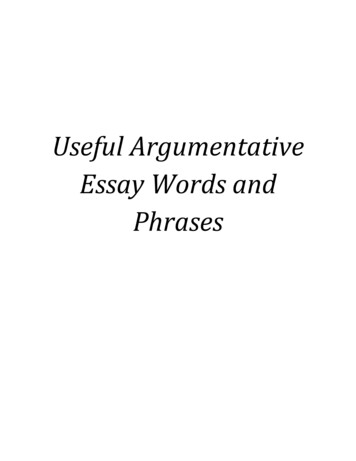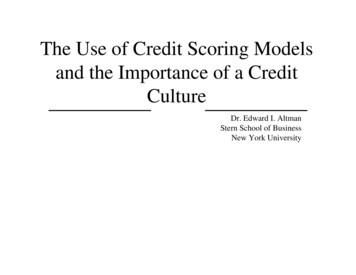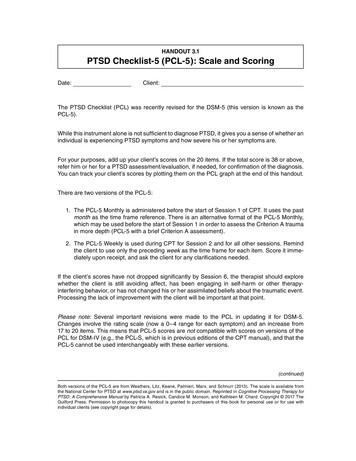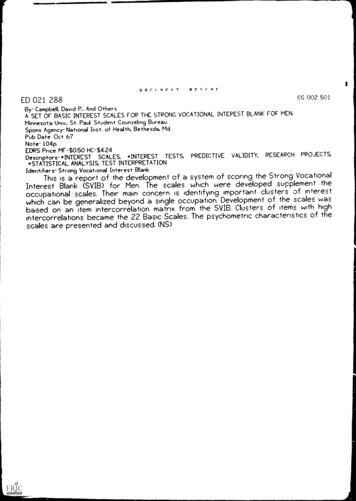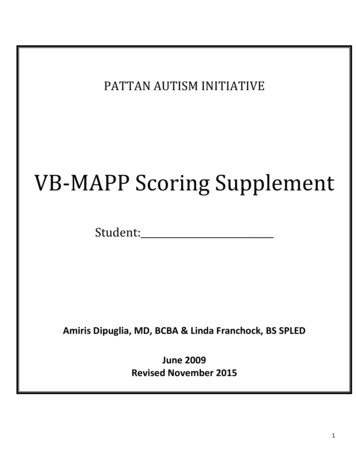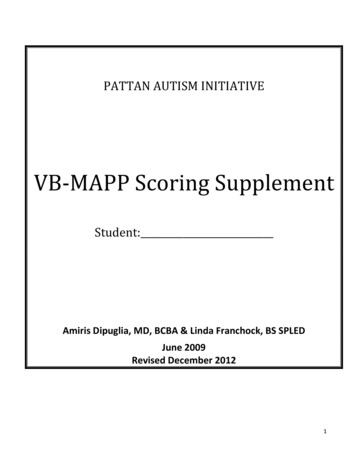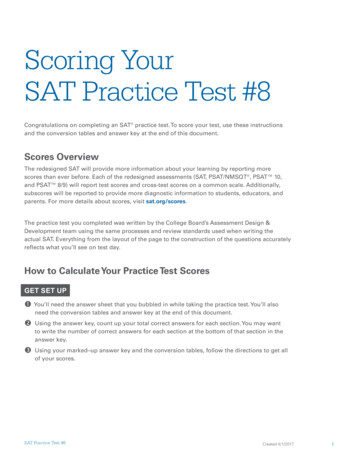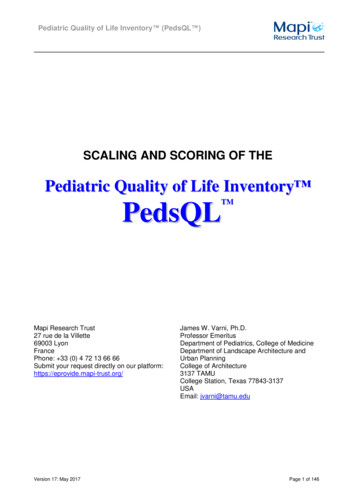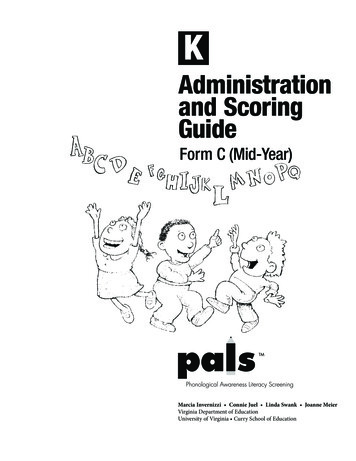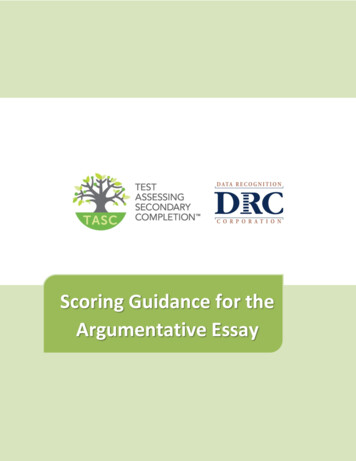
Transcription
Scoring Guidance for theArgumentative Essay
TASC Test Assessing Secondary Completion What are Exemplars?Exemplars are descriptions of typical student skills and behaviors that a teacher looks for whenevaluating performance. They provide criteria or guidelines for evaluating student performanceby determining ratings based on a scoring rubric. Standards rubrics define what meets today'seducational assessment criteria, allowing teachers (and students) to distinguish betweendifferent levels of performance.How do I score examinee practice essays?Handscoring the TASC Test essay response utilizes three component elements: the rubric, theanchors, and additional samples for training or clarification. These components are generallydefined below and provided in detail in subsequent pages of this section of the manual.Rubric:The foundation of handscoring is the rubric. The rubric provides the descriptive requirementsfor each score point that can be awarded to an examinee’s work and is the primary tool used inmaking scoring decisions. In scoring Writing prompts, the rubric will guide the scorer in how tolook at the essay as a whole in order to determine a single score. The TASC Test Essay ScoringRubric has a score range from 0-4. When taking the TASC Test the essay score is doubled tobecome part of the official Writing Subtest score.Anchors:For each score point in the rubric, the anchor paper is a response that best typifies the rubric. Itis not a borderline paper but rather one that falls within the rubric-designated score point fairlyclearly. The anchor sets the standard for that score point and is occasionally referred back to bythe scorer in order to maintain consistency in scoring.Additional Examples:Additional examples are sometimes provided to help a scorer understand the range of a scorepoint. They are used to demonstrate the differences between two or more papers of the samescore point and to help scorers better determine where the lines fall between two differentscore points.The Rubrics Used for the TASC Test Writing Prompt Are As Follows:Score Point: 0The response is completely irrelevant or incorrect, or there is no response.
Score Point: 1The response provides evidence of an attempt to write an essay that offers an opinion orargument. Weakly states or alludes to an opinion or claimHas minimal support for opinion or claimMay be too brief to demonstrate an organizational structureMakes no attempt to acknowledge or counter opposing claimsUses words that are inappropriate, overly simple, or unclearProvides a minimal or no concluding statement or sectionHas errors in usage and conventions that interfere with meaningScore Point: 2The response is an incomplete or oversimplified essay that develops and supports an opinion orargument. Attempts to establish an opinion or claimDevelops, sometimes unevenly, reasons and/or evidence to support opinion or claimAttempts to use an organizational structureMakes little, if any, attempt to acknowledge or counter opposing claimsUses simple language, which sometimes lacks clarityProvides a weak concluding statement or sectionMay have errors in usage and conventions that interfere with meaningScore Point: 3The response is a complete essay that develops and supports an opinion or argument. Clearly introduces an opinion or claimUses reasoning and evidence to support opinion or claimUses an organizational structure to present reasons and relevant evidenceAttempts to acknowledge and/or counter opposing claims, as appropriateUses clear word choiceUses words and/or phrases to connect ideasUses an appropriate toneProvides a concluding statement or section that follows from the ideas presentedHas few, if any, errors in usage and conventions that interfere with meaning
Score Point: 4The response is a well-developed essay that develops and supports an opinion or argument. Effectively introduces an opinion or claimUses logical, credible, and relevant reasoning and evidence to support opinion or claimUses an organizational strategy to present reasons and relevant evidenceAcknowledges and counters opposing claims, as appropriateUses precise and purposeful word choiceUses words, phrases, and/or clauses that effectively connect and show relationshipsamong ideasUses and maintains an appropriate toneProvides a strong concluding statement or section that logically follows from the ideaspresentedHas no errors in usage and conventions that interfere with meaningTASC Test Writing Prompt ExemplarsScore Point 4We like to think of ourselves as a prosperous and caring society, but some of our seniors maybe our neediest citizens. They have usually worked and paid income and property taxes foryears, which helped to finance free public libraries. Our seniors would experience a hardship ifthey had to pay even a small fee out of their fixed income to later use the libraries that their taxdollars funded. While the library system is not “free,” it is a system that they have paid into,often for decades. There is inherent good in a system that allows collaboration among many inorder to achieve a greater good, and the public library system does a tremendous amount ofgood for a relatively small taxpayer investment.It is true that the services offered by public libraries are not technically "free.” As noted in thearticle “Can We Afford ‘Free” Libraries?” there are costs associated with facilities, personnel,and technology, among others, that taxpayers must pay for. However, libraries are invaluableto a society that places a high premium on giving everyone equal access to life-enhancingeducational materials and opportunities. If we honestly assess our country’s state of affairs, wewould have to admit that not everyone can afford to purchase books and music recordings. Noteveryone can afford to purchase a computer system for the home. There are many people,particularly senior citizens, who have even had to stop their subscriptions to their localnewspapers and go to a library to read the daily news. Additionally, there are many people whocannot afford to pay fees for the use of facilities where they can meet with friends who sharecommon interests.
Few places remain in our communities where people can enter without an admission price, sitcomfortably in a heated or air-conditioned environment, and have the quiet enjoyment ofreading a newspaper or magazine. People may often first associate children with libraries.However, libraries offer services for teens looking to apply for their first job and for studentspreparing their college entrance essays. Many local libraries offer tax preparation services at nocost for seniors and low-income families, and they offer their facilities to be used for exerciseclasses for seniors or meeting places for community organizations.Libraries are indeed a “worthwhile investment” as argued in the article “The WorthwhileInvestment in Free Public Libraries.” Libraries can be “anchors in the community” by providingresources, preserving history, facilitating services, and bringing people together. Even in today’schanging world, tax dollars for libraries are well spent.Annotation: This 4-point response is a well-developed essay that strategically builds to theconclusion that libraries are a “worthwhile investment” for communities in that they servemany people in a variety of ways. The essay uses text-based evidence to support the claim:libraries preserve history; they offer services, such as tax preparation assistance or meetingplaces; they offer a quiet place to read and learn. The essay also addresses counter-claims(from the second article) that the services are not “free” by noting the invaluable services thatlibraries provide. The ideas are well connected throughout the essay, and the connections arefurther enhanced by the variety of sentence structure employed by the writer. The preciseword choice (“prosperous and caring society,” “inherent good,” “life-enhancing,” “facilitatingservices”) contributes to the essay’s formal, reasoned tone. There are no errors in usage orconventions that interfere with meaning.Score Point 3Although libraries once were important to communities, they have lost that importance andtherefore should no longer be free to the public. Fees should be established for the servicesthat the libraries provide. Tax payers should not bear the burden of operating libraries that theyno longer use.The article titled “Can We Afford ‘Free’ Libraries?” states that “the library is losing some of itsrelevance.” This is true. People now have computers they can use to Google anything theywant. They no longer have to go to a library to look through old books and newspapers to findthe information they need. They can also use computers to purchase books for themselves andtheir children from Amazon. They can build their own libraries without having to drive or walkto the community library to look for books that may end up not even being there. The articlealso says that tax payer’s money should go to other more important services, like EMT and firedepartments. Saving people’s lives is far more important than giving them a place to hang out.As the article points out, taxes should be used for these services because they “could savevaluable jobs and services.”
It’s true that a library also employs people and provides services. Like the first article says,libraries do give people a place to meet, they help educate people, and they preserve history.But why must all taxpayers pay for these, especially if they don’t use the services? Therefore,libraries should charge membership fees to belong. If people don’t want to pay the fees, theycan go to schools.In conclusion, I feel that libraries should no longer be subsidized by tax payer’s money. Librariesare a thing of the past. “The nonprofit public library is well over 100 years old.” People whowant a library should pay for it, and people who don’t use libraries should use their money tosupport other community services.Annotation: This 3-point response addresses the demands of the prompt and is a completeessay with a clear introduction, development, and conclusion. The essay uses evidence andreasoning from the texts (lack of relevance, other services that need taxpayers’ money) tosupport the claim that libraries should no longer be free to the public and funded by taxpayers’money. The claim is clearly established in the first paragraph and supported with text-basedevidence in the second paragraph. The third paragraph attempts to acknowledge and refute thecounter-claim that libraries offer employment and services for a community, but there is someambiguity in this part of the argument. Overall, the ideas are connected (references to jobs atend of second paragraph and beginning of third, use of transitional words such as “also” and“therefore”), and the word choice is simple, but clear. There is some attempt at using moreacademic language (“bear the burden,” “subsidized”). The few errors in usage (apostrophe usein phrase “taxpayers money,” run-on sentence in third paragraph, some unclear pronounreferences) do not interfere with the essay’s overall meaning but do indicate a lack ofknowledge and/or application of basic rules.Score Point 2Yes, libraries should still be free to everyone. Some people cannot afford internet or computersand can’t learn information they need to know unless they have a library where they can dothat. Other people need help with their taxes. Some people need a place to meet their friendswhere it’s quite and you can work.Everyone has to pay a lot of taxes. Too much, I think. So we should get something from all thosetaxes that we pay.Libraries help to make people smarter, like the article says. They help people self-educate andstop “brain drain.”Libraries also are a place where history can be saved. Like, important things about yourcommunity can be found out by going to the library.They are a hub of community activity because they are a place where people can meet andlearn things, like how to get ready for a test or how to babysit. If we didn’t have libraries,
people will not have a place to learn those things for free. They would have to pay for them andnot everyone has the money to pay for those services.People’s taxes are needed for other services, too, like EMT and fire services, that are true. Butthat doesn’t mean taxes can’t still keep libraries open and free to the public. So I say, keeplibraries free to keep people smart.Annotation: This 2-point response is an over-simplified essay that weakly states the claim in thefirst sentence (“Yes, libaries should still be free to everyone”) and then supports the claim withideas from the text and the writer’s own experiences and ideas. The essay has an introduction(statement of claim), uneven development, and a simple conclusion. The writer has attemptedto use text-based support in paragraphs 1-3 in which ideas are taken rather directly from thetext that supports free libraries. There are inconsistencies in how the text evidence isintegrated, quoted, or acknowledged. The paragraphs are simple and lack full development.The writer’s word choice is informal and sometimes vague (“Like, important things”). Errorsthroughout the essay (frequent misspelling of “libraries” and other words, lack of apostrophe in“thats” and “its,” sentence structure errors, capitalization errors) indicate a lack of knowledgeabout usage and conventions, even though a reader may still be able to determine the intendedmeaning.Score Point 1Even though libraries are good to have, we really don’t need them anymore! Now we havecommuters and can get what we need on our phones. Libraries use to be a place to go toborrow books or read the news or sometimes to go to a meeting. Like AA meetings. Those weregood reasons to have a library. But now libraries don’t mater. We can do all those things on ourphones. Well, maybe we can’t have meetings on our phones. But you can set a meeting date onyour
In scoring Writing prompts, the rubric will guide the scorer in how to look at the essay as a whole in order to determine a single score. The TASC Test Essay Scoring Rubric has a score range from 0-4. When taking the TASC Test the essay score is doubled to become part of the official Writing Subtest score. Anchors: For each score point in the rubric, the anchor paper is a response that best .
